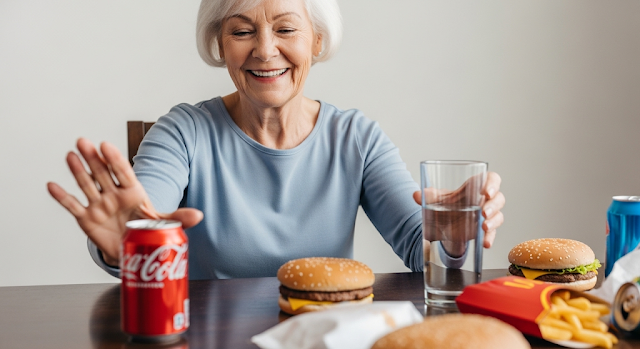Warning: Even minor falls can cause fractures with osteoporosis. Start protecting your bones today.
What Is Osteoporosis?
Osteoporosis is a condition where bones become weak and brittle, making them prone to fractures from minor bumps or falls. It's often called a "silent disease" because bone loss occurs without symptoms. Women over 50 and men over 70 are at highest risk, especially after menopause when estrogen levels drop.
Key Facts: One in two women and one in four men over 50 will break a bone due to osteoporosis.
Why Seniors Should Worry 🚨
Osteoporosis-related fractures can be life-changing. Hip fractures often lead to:
- Loss of independence
- Chronic pain and disability
- Increased mortality risk (up to 20% within one year)
- Extended hospital stays and nursing home placement
The scary part? You might not know you have osteoporosis until you break a bone.
Essential Prevention Strategies
Weight-Bearing Exercise 💪
- Walking: 30 minutes daily, brisk pace
- Stair climbing: Use stairs instead of elevators
- Dancing: Fun and effective for bone density
- Light jogging: If joints allow
Strength Training
- Resistance bands or light weights
- Bodyweight exercises (squats, modified push-ups)
- 2-3 times per week, 20-30 minutes
Balance & Flexibility
- Tai chi or yoga (reduces fall risk)
- Standing on one foot exercises
- Heel-to-toe walking practice
Bone-Building Nutrition 🥛
Calcium-Rich Foods
| Food | Serving | Calcium Content |
|---|---|---|
| Milk | 1 cup | 300mg |
| Greek yogurt | 1 cup | 400mg |
| Cheddar cheese | 1 oz | 200mg |
| Sardines | 3 oz | 325mg |
| Kale | 1 cup cooked | 180mg |
Daily Goal: 1,200mg for women over 50, 1,000mg for men over 70
Vitamin D Sources
- Sunlight: 15-20 minutes daily (arms/legs exposed)
- Fatty fish: Salmon, mackerel, tuna
- Fortified foods: Milk, cereals, orange juice
- Supplements: 800-1000 IU daily (consult doctor)
Foods to Limit ⚠️
- Excessive caffeine: More than 3 cups coffee daily
- High sodium: Processed foods, restaurant meals
- Alcohol: Limit to 1 drink daily for women, 2 for men
- Soft drinks: Phosphoric acid may weaken bones
Lifestyle Changes That Matter
1. Quit Smoking 🚭 Smoking reduces bone density and slows healing after fractures.
2. Fall-Proof Your Home
- Remove throw rugs and clutter
- Install grab bars in bathrooms
- Improve lighting, especially staircases
- Wear supportive, non-slip shoes
3. Get Regular Bone Density Tests
- Women: Starting at 65
- Men: Starting at 70
- Earlier if risk factors present
Simple Daily Routine
Morning (10 minutes)
- 5-minute walk around the block
- Drink a glass of milk or fortified orange juice
Afternoon (15 minutes)
- Resistance band exercises
- Balance practice (standing on one foot)
Evening
- Calcium-rich dinner
- 15 minutes of sunlight (if possible)
Warning Signs to Watch For 🔍
- Loss of height (more than 1.5 inches)
- Stooped posture or hunched back
- Back pain from compressed vertebrae
- Fractures from minor falls or bumps
Action Step: If you notice these signs, see your doctor immediately for bone density testing.
Quick Prevention Checklist
Daily Must-Dos:
✅ 30 minutes weight-bearing activity
✅ 1,200mg calcium intake
✅ 15 minutes sunlight exposure
✅ Balance/strength exercises
Weekly Goals:
✅ 2-3 resistance training sessions
✅ Tai chi or yoga class
✅ Review home safety
Annual Tasks:
✅ Bone density test (if recommended)
✅ Vitamin D blood level check
✅ Medication review with doctor
When to See a Doctor
Immediate consultation needed if:
- You've had a fracture after age 50
- Family history of osteoporosis
- Taking medications that affect bones (steroids, etc.)
- Early menopause (before 45)
- Chronic conditions affecting bone health
Testing Options:
- DEXA scan: Gold standard for bone density
- Blood tests: Vitamin D, calcium levels
- FRAX assessment: 10-year fracture risk calculation
Frequently Asked Questions
Q: Can osteoporosis be reversed? A: While lost bone can't be fully restored, progression can be slowed and fracture risk reduced significantly with proper treatment.
Q: Are calcium supplements necessary? A: If you can't get enough from food (1,200mg daily), supplements help. Take with vitamin D for better absorption.
Q: Is it too late to start exercising at 70? A: Never too late! Even gentle exercises like walking and tai chi can improve bone health and reduce fall risk.
Q: How often should I get tested? A: Every 2 years if you have osteoporosis, every 2-5 years for monitoring if you're at risk.

.png)
.png)
.png)
.png)
.png)
.png)
.png)
.png)
.png)
.png)
.png)